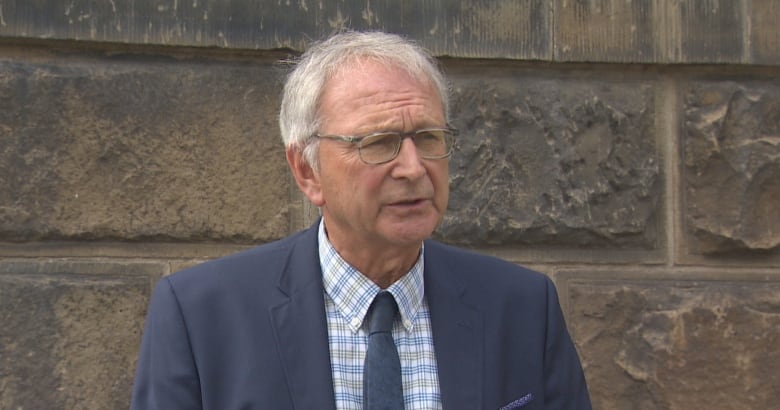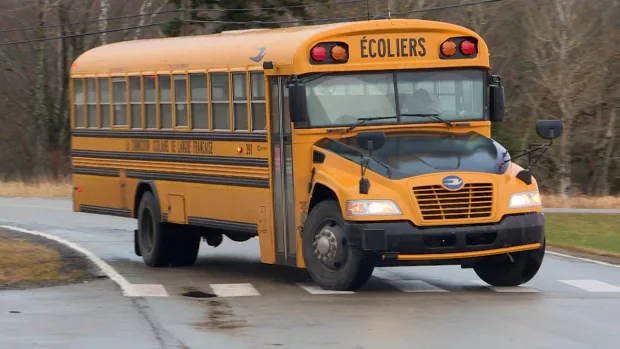Parents have had to scramble to adjust to online learning during the strike by school support staff and bus drivers.

Parents in New Brunswick say they are relieved to have their children back in school Monday, after weeks of scrambling to adjust to online learning during a strike by school support staff and bus drivers.
More than 22,000 public-sector workers have either returned to work or will be back this week, after going on strike more than two weeks ago, largely over wage and pension issues. Schools closed and students moved to online learning after about 3,000 custodians, bus drivers, school library assistants and administrative support staff joined the strike Oct. 29.
During the strike, parents had to figure out child care while they worked, or had to take time off to be with their young children. But, on Sunday, the Canadian Union of Public Employees (CUPE) and the government of New Brunswick reached a tentative agreement on a contract.
“[It’s] just as such a huge feeling of relief,” said Vivien Zelazny, who has four young children, ages 11, nine, five and two, and is an assistant professor at Fredericton’s St. Thomas University.
“The kids are so excited to be back to school, and that’s going to be nice for us just to have a … more normal week.”
The strike has been especially difficult for children who depend on educational assistants or rely on routines, such as those with autism or learning difficulties.
Laurie LeBlanc’s 14-year-old son, Josh, is in Grade 9, and has autism and a seizure disorder. She said the strike affected his routine, causing difficulties in all aspects of his life — from sleep to socialization.
“It was a couple of steps back for him,” she said. “We probably have gone back to the beginning of the year. So, we’re starting over again.”
She said it will take Josh a while to get used to being in school with large groups of students again.
“He’s been at home, you know, with a caregiver or me or my spouse or my husband.”

Although teachers were not striking, and 45 per cent of educational assistants are designated essential and couldn’t strike, Education Minister Dominic Cardy previously said a lack of cleaning staff would make in-person learning too dangerous because of the COVID-19 pandemic.
Premier Blaine Higgs said Monday that he understands the impact the strike had on children and their parents, and he’s “sympathetic to that.”
“But, I’d like to think that they understand that, well, what I’m trying to do through any of this is balance the taxpayer and the employee. Because it’s a taxpayer that pays all the bills.”
Premier says strike ‘could have been avoided’
Last week, the province ordered striking health-care workers back to work using an emergency order. CUPE is challenging the order in court.
Both sides agreed not to disclose the terms of the tentative agreement reached late Saturday, but CUPE president Steve Drost said the new wage proposal would allow workers to keep up with the cost of living in the province.
“Neither side always, you know, gets everything they want, but we feel that both sides were able to reach a fair compromise.”
Drost said the 10 locals involved in the strike will be voting this week, with votes expected to wrap up by Friday. He said if the agreement gets the approval of workers, details of the terms will be shared then.
Higgs said the strike “could have been avoided,” but he wouldn’t have done anything differently.
WATCH | N.B. Premier Higgs spars with CUPE leaders:

Higgs spars with CUPE leaders outside legislature
New Brunswick Premier Blaine Higgs made a surprise appearance at a news conference held by the Canadian Union of Public Employees outside the legislature on Friday, a week after public-sector workers went on strike. 1:48
“Sometimes it takes some added focus on both sides to be able to finalize an agreement,” he said.
Higgs welcomed workers back to the job.
“It’s not like the strike should carry over any any ill feelings of any kind, because I’m sure that everyone will be received with open arms today,” he said. “Great to have you back on the job.”

